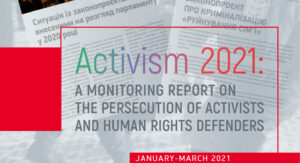Last Monday, I met with Human Rights Defenders (HRDs) from Russia at the webinar organised by OVD-Info, Human Rights Center “Memorial” and International Memorial which was supported by the “7×7” media outlet.
I heard from a diverse range of HRDs, including Olga Podoplelova, Dmitry Gurin, Elena Pershakova, Valeria Vetoshkina, Dmitry Treshchanin, Denis Shedov, Olga Gnezdilova, Polina Filippova, and several others who submitted written comments during the discussion.
The participants represented all four categories that can be designated as “foreign agents” in Russia, ranging from media outlets and NGOs to unincorporated associations and even individuals. Some of them were lawyers, some – journalists, some – researchers and human rights educators. What they had in common, however, was their view of the Foreign Agents Law as deliberately vague and designed to hamper legitimate human rights work.
The defenders told me that the “foreign agent” label was applied to those human rights initiatives that are most effective at their work and ironically became a mark of quality. However, I understood that this designation was costing them heavily – they spoke about facing hefty fines, or burdensome labelling and reporting requirements that left little time for human rights work, as well as inspections by the authorities. I was disturbed to hear that those who try to abide by the law still feel like they are in a “minefield” and expect punishment regardless.
I listened with great concern as HRDs told me that the forced dissolution of Memorial was just the tip of an iceberg. Dozens of human rights groups prefer to stop their work and self-dissolve rather than bear the “foreign agent” stigma. Some others – especially in remote regions – would like to continue their work but cannot raise funds to pay fines. This creates the anticipation that, as one defender put it, soon “no civil society organisations will be left, zero”.
For those who continue working against the odds, the designation means stopping certain lines of human rights work and facing daily discrimination, loss of partnerships, audience, employees, and interns. As a result, vulnerable groups of Russians are affected, especially in remote areas, where contact with Human Rights Defenders is already scarce.
It was disturbing to hear that lawyers are designated as “foreign agents” for their work and that they now say they are more cautious about whom to defend. I was also concerned by the reports that HRDs are named “foreign agents” for defending women’s rights and the double-discrimination this label creates for women.
It’s inspiring to see the level of solidarity among Russian HRDs and their determination to continue defending human rights. My mandate has already written 13 communications to the Russian Federation concerning the Foreign Agents Law, and I hope to see it repealed or revised in line with international standards in the near future.



